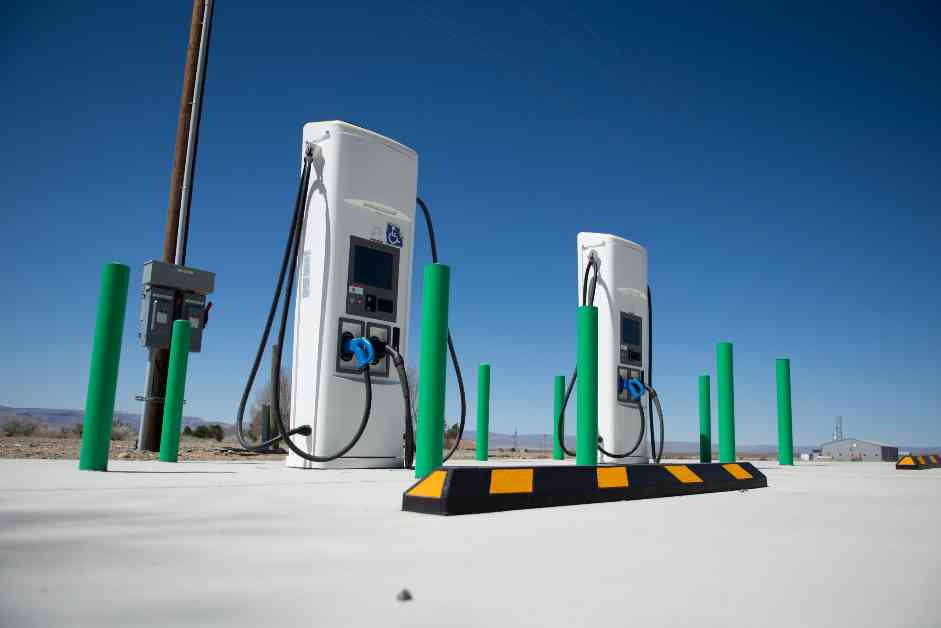Nevada Poll: Support for Clean Energy Tax Credits and EVs
A recent poll conducted in Nevada has revealed significant bipartisan support for tax credits for electric vehicles (EVs) and clean energy initiatives. The survey, which was released on Wednesday, found that a majority of Nevadans are in favor of federal regulations aimed at increasing fuel efficiency requirements for new cars.
The poll, conducted by the Program for Public Consultation at the University of Maryland’s School of Public Policy, surveyed 594 adults in Nevada from July 10-19. The results showed that at least 74 percent of Nevadans support existing tax credits for purchasing new and used EVs as well as for installing EV charging stations. What’s more, the poll found that at least 76 percent of Nevadans are in favor of maintaining a range of clean energy and energy efficiency tax credits.
These findings indicate widespread support for the climate provisions of the Inflation Reduction Act of 2022, a comprehensive piece of legislation that includes incentives to lower greenhouse gas emissions. The results of the Nevada poll align with similar surveys conducted in other swing states and nationally, which also showed bipartisan majorities in favor of clean energy initiatives.
EV Ownership and the 2024 Election
The issue of EV ownership has emerged as a key topic in the upcoming 2024 election, particularly in Nevada, where the number of electric vehicles on the road is steadily increasing. As of June, there were over 44,000 electric vehicles registered in Nevada, up from 33,000 in 2022.
Federal tax credits are available through 2032 for consumers purchasing new and used clean vehicles, including all-electric, hybrid, and fuel cell electric vehicles, as well as charging infrastructure. Individuals with an income of less than $150,000 who purchase new EVs can qualify for up to $7,500 in tax credits, while those making less than $75,000 annually purchasing used EVs can receive up to $4,000 in tax credits.
The poll found that a majority of Nevadans support these tax credits, with 74 percent backing the credit for new EVs and 77 percent supporting the credit for used EVs. Additionally, residents investing in residential charging stations can qualify for a tax credit of up to 30 percent of the cost, with a maximum of $1,000.
Clean Energy and Energy Efficiency Tax Credits
As part of the Inflation Reduction Act, homeowners nationwide can access up to $3,200 in income tax credits annually through 2032 for completing energy-efficient home upgrades. These rebates can cover up to 30 percent of the costs spent on energy efficiency replacements for products such as doors and insulation.
The poll found that Nevadans overwhelmingly support these measures, with approval ratings ranging from 76 percent to 86 percent depending on the specific tax credit. Respondents were also in favor of maintaining these tax credits, with no more than 24 percent supporting their repeal.
In Nevada, programs like Solar For All, administered by the nonprofit Nevada Clean Energy Fund, are set to offer rebates and financing for low-income solar projects. The Nevada Governor’s Office of Energy is expected to provide federal home energy rebates for high-efficiency electric and energy savings measures.
Fuel Efficiency Requirements and Transportation Emissions
Transportation accounts for nearly a third of greenhouse gas emissions in the United States, with light-duty vehicles being the largest contributors. The Environmental Protection Agency has introduced a regulation requiring new light-duty vehicles to be 20 percent to 30 percent more fuel-efficient by 2027.
Though this regulation is expected to raise the price of new vehicles, it will ultimately save vehicle owners money in the long run. Consumers are projected to save an average of $6,000 over the lifetime of a new vehicle once the standards are fully implemented.
The poll found that 66 percent of Nevadans support this measure, with 57 percent of Republicans and 86 percent of Democrats in favor. One respondent highlighted the need for reasonable fuel efficiency goals and suggested exploring alternative fuels in addition to electric vehicles.
Opposition to Offshore Drilling
While offshore drilling does not directly impact Nevada, 72 percent of respondents in the poll opposed increasing the use of offshore drilling. This sentiment was shared across party lines, with 60 percent of Republicans and 81 percent of Democrats expressing opposition.
The Biden administration’s decision to continue allowing offshore oil and gas leasing while reducing available acreage has drawn criticism from environmental groups and oil producers alike. Offshore drilling accounts for a significant portion of the United States’ oil production, with about 14.6 percent coming from offshore sources in 2022.
In conclusion, the poll results reflect a strong bipartisan consensus in Nevada in support of tax credits for EVs and clean energy initiatives. These findings underscore the importance of addressing climate change and promoting sustainable energy solutions in the state and beyond.



